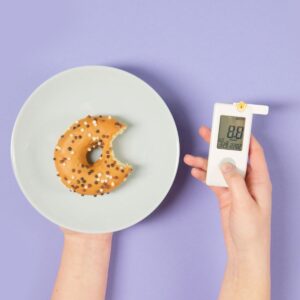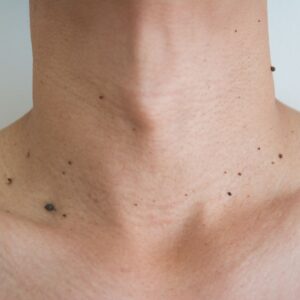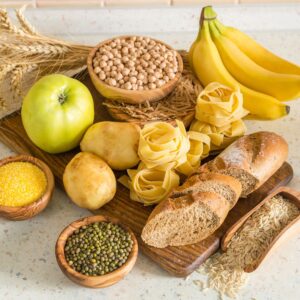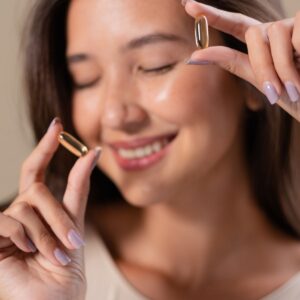Blog
The Most Effective Natural Ways to Treat PCOS
Polycystic Ovary Syndrome (PCOS) is a common hormonal disorder that affects many women during their reproductive years. In this condition, the ovaries produce an abnormally high amount of androgens—male hormones that are naturally present in small amounts in women. When these hormone levels rise, they disrupt the hormonal balance, leading to a range of symptoms.
In this article, we’ll explore the top 3 natural ways to treat PCOS and hormonal imbalance, with a strong focus on improving fertility and restoring healthy hormone function. You’ll also find key insights into the root causes of PCOS, common symptoms, and, in the end, nutritional tips and supplements that support hormonal healing.
Root Causes of PCOS
PCOS doesn’t appear out of nowhere—it often results from a combination of several underlying issues:

- Genetic predisposition (though this plays a relatively small role)
- Insulin resistance: One of the leading causes of PCOS. High insulin prevents androgens from converting into estrogen, disrupting hormonal balance—even in women who aren’t overweight.
- Environmental toxins: Daily exposure to chemicals like plastic containers with BPA, air fresheners, non-stick cookware coatings, and pesticides introduces xenoestrogens—synthetic compounds that mimic estrogen and trigger hormonal chaos.
- Gut issues such as leaky gut, IBS, or chronic inflammation. Harmful gut bacteria release LPS, a toxin that increases insulin resistance and contributes to PCOS.
How Is PCOS Diagnosed?
If two out of the following three signs are present, there’s a strong chance of PCOS:
- Ovarian cysts visible on ultrasound
- Signs of elevated androgens
- Irregular periods or ovulation issues
Mild and Severe PCOS Symptoms

- Ovarian cysts (one of the key signs of PCOS)
- Insulin resistance: stubborn belly fat, fatigue, difficulty losing weight
- High androgens: facial hair, acne, hair thinning or hair loss
- Irregular cycles, poor ovulation, and difficulty getting pregnant
- Skin tags around the neck or underarms
- Darkened or thick skin patches at the back of the neck or armpits
- Weight gain or fat storage around the belly
Note: 30–40% of women with PCOS are not overweight but still experience insulin resistance.
Can You Get Pregnant with PCOS?
Yes, pregnancy is possible with PCOS, especially when the root causes are addressed through natural strategies like improving insulin sensitivity, cleaning up the diet, and making lifestyle adjustments. In fact, many women begin to see signs of recovery within just 3 months of consistent commitment.
Top 3 Natural Treatments for PCOS

1. Addressing Insulin Resistance
- Cut out all sugars—even natural ones. Limit to 1–2 teaspoons daily max (including honey, coconut sugar, or dates). Choose natural alternatives like monk fruit, stevia, or allulose instead.
- Start your day smart: No sugar for the first 2–3 hours after waking up. Stick to water, unsweetened herbal teas, or green juice.
- Avoid high-sugar fruits like mangoes and grapes. Choose low-sugar options like berries, oranges, kiwis, and pomegranates.
- Smart carbs only: brown rice, oats, quinoa, and sweet potatoes—always paired with healthy fats and proteins.
- Apple cider vinegar: 1 tbsp with water before meals (twice a day).
- Sleep 7–8 hours a night to regulate insulin.
- Reduce stress by setting aside one hour daily for activities you enjoy. Elevated cortisol (your stress hormone) worsens insulin resistance.
- Try intermittent fasting 3x/week (14–16 hours). Avoid if you’re pregnant, breastfeeding, under 18, underweight, or experience dizziness when fasting.
- Exercise regularly: walking, aerobics, or Zumba at least 3–4 times per week (30 minutes).
Best supplements for insulin resistance: Berberine, chromium, myo-inositol, and inositol—these boost ovulation and regulate cycles.
What to eat to reverse PCOS? A fiber-rich, anti-inflammatory, low-sugar diet is your foundation.
2. Eliminating Environmental Toxins
- Switch from plastic to glass containers.
- Soak fruits and vegetables in vinegar water to remove pesticide residue.
Support your liver (your detox organ) with:

- Beetroot juice
- Dandelion tea
- Garlic and ginger
- DIM supplement (from broccoli extract)
- Milk thistle herb
These help flush out excess estrogen and rebalance your hormones.
3. Healing the Gut
- Cut down on inflammatory triggers: gluten, dairy, and sugar.
- Use natural antimicrobials: oregano oil, manuka honey, virgin coconut oil, green juice, and olive leaf extract.
- Rebuild the gut with:
- Bone broth
- Collagen-rich soups
- Fermented foods
- Probiotic supplements
- Prioritize whole foods, fiber, and clean protein to nourish beneficial gut bacteria and improve digestion.
Top Fertility-Boosting Foods and Supplements for Women With PCOS

- Red raspberry leaf tea
- Organic soy products (tofu, tempeh, soy milk)
- Ground flaxseeds and hemp seeds
- Maca root powder: 1 tsp daily boosts estrogen and progesterone.
- Vitamin D3 (after testing): supports fertility and helps with weight loss.
- Omega-3s, magnesium, and CoQ10 improve cycle health and hormonal balance.
- Myo-Inositol, a form of vitamin B, helps stimulate ovulation and regulate cycles within 3 months. It also reduces insulin and testosterone levels and improves fertility within 3–6 months.
- Probiotics: essential for gut balance, hormone detox, and overall hormonal health.
Final Thoughts
Wondering if PCOS can be cured naturally?
The answer starts with your daily habits. A targeted lifestyle approach that addresses insulin resistance, reduces toxic exposure, and heals the gut is the most powerful path to reversing PCOS, improving fertility, and restoring hormonal balance—naturally and sustainably.
PCOS can be reversed through choosing the right protocol and lifestyle changes. Follow the link below to reach the subscription details for a full PCOS protocol that suits you:
If you need more detailed information about how to heal naturally from PCOS and boost fertility, watch below the full episode on Dr. Fajer AlJumairi’s YouTube channel:

